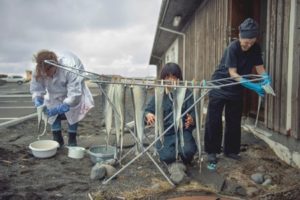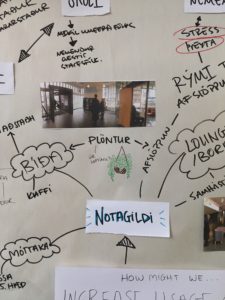EKSIG 2019: KNOWING TOGETHER – EXPERIENTIAL KNOWLEDGE AND COLLABORATION
International Conference of the DRS Special Interest Group on Experiential Knowledge at Estonian Academy of Arts, 2019
EKSIG 2019 will address the theme of “Knowing Together – experiential knowledge and collaboration”.
Date: Monday and Tuesday, 23 – 24 September 2019
Venue: Estonian Academy of Arts, Estonia
We are pleased to announce our first keynote speaker, Prof. Ron Wakkary, Everyday Design Studio, Simon Fraser University, Vancouver, Canada.
With the theme ‘Knowing Together – experiential knowledge and collaboration’ the conference aims to provide a forum for debate about knowledge generation in collaboration by professionals and academic researchers in the creative disciplines and beyond.
Creative practice has transformed from one based on the production of material artefacts to one that engages expertise and knowledge from multiple disciplines. Recent research in the creative disciplines has revolved around the changing territorial context of ‘making’ and has increasingly involved professionals and academic researchers working collaboratively to explore an interdisciplinary inquiry. Collaboration in such research has therefore become vital. A research team may comprise different disciplinary experts, such as scientists, technologists, artists, designers, architects, psychologists, business strategists and policy makers, working across academic, commercial and public sectors. They may work with materials and/or non-materials. Examples include research the fields of New Materials, Smart Textiles, Virtual Materiality, Material Innovation, Embodied Ideation, and Participatory Practices in Business in which various partners are in dialogue with one another, developing, consolidating and enhancing knowledge while generating new opportunities for interdisciplinary knowledge exchange.
EKSIG 2019 aims to examine collaboration within research and commercial teams that comprise creative professionals/researchers (such as designers, artists, architects, etc.) and members with other diverse disciplinary expertise. This is to understand how individual experiential knowledge, or knowledge gained by practice, is shared, how collective experiential knowledge is accumulated and communicated in and through collaboration, and how it is embodied in the outputs and may be traced back to the origin of the practice. The conference also aims to illuminate ‘making’ as the action of change in which matter and materials are transformed through collaboration, interaction or negotiation between the collaborative team and their material and non-material environments.
This conference welcomes contributions exploring and discussing experiential knowledge generated when researchers and practitioners collaborate with experts in other fields. We interpret collaboration here in the widest possible sense to include any kind of working together. We are interested in building a rich collection of case studies that illuminate the relationships built within the collaboration, the approaches used and the new knowledge gained and transferred within the team. This is expected to contribute to a more systematic approach for studying and integrating experiential knowledge into collaborative practice and research.
Questions of interest are for example:
- What are the current understandings of collaboration and interdisciplinary research?
- How can collaboration be utilised within the framework of research?
- How can a researcher’s disciplinary expertise benefit collaborative research and practice?
- How can we articulate material (and immaterial) knowledge which are tacit and embodied within the process of research?
- How can skills and embodied knowledge in different professional disciplines be shared and/or applicable to one another in a collaborative practice?
- How can we gain and communicate individual and collective experiential knowledge in and through collaboration, and how is it embodied in the outputs and may be traced back to the origin of the practice?
- What means and methods can be utilised to transfer and replicate tacit knowledge accumulated in collaborative practice?
We wish to bring together engaged professionals and scholars from various disciplinary backgrounds, fields of knowledge production and methodological approaches to explore these issues. We invite contributions from creative subjects and other disciplines, e.g. design, architecture, engineering, craft, media, HCI, performance, music, fine art, curation, museology, archaeology, philosophy, knowledge management, education, health, cognitive science, gastronomy, oenology, sensory studies, etc., that are concerned with collaboration in research and in creative and professional practice.
For EKSIG 2019, we invite submission of full papers (4000-5000 words) which offer new or challenging views on the subject. Papers will be selected subject to a double-blind peer-review process by an international review team.
Please submit your full papers via EasyChair – https://easychair.org/conferences/?conf=eksig2019.
Author’s Guide for the EKSIG2019 can be found on the conference website http://www.eksig2019.com/calls/
KEY DATES
First call for papers – 19 December 2018
Second call for papers – 29 January 2019
Third call for papers – 4 March 2019
Submission of full papers – 5 April 2019
Notification of acceptance of papers – 10 June 2019
Submission of final revised papers – 19 July 2019
Conference – 23–24 September 2019
CONFERENCE ORGANISERS
Kristi Kuusk, Estonian Academy of Arts, Estonia
Nithikul Nimkulrat, OCAD University, Canada
Julia Valle Noronha, Estonian Academy of Arts, Estonia / Aalto University, Finland
Camilla Groth, University of Southeast Norway / Aalto University, Finland
Oscar Tomico, ELISAVA | Barcelona School of Design and Engineering, Spain
Kristina Niedderer, Manchester Metropolitan University, UK
ABOUT EKSIG
EKSIG is part of a programme of Special Interest Groups set up by the Design Research Society (DRS) in 2007 to facilitate international exchange and advance in relevant areas of design. EKSIG is concerned with the understanding and management of experiential knowledge in research and professional practice in design in order to clarify fundamental principles and practices, with regard to both research degree regulations/requirements and research methodology. Please see http://experientialknowledge.org.uk for more information about the Special Interest Group and previous conferences.
EKSIG 2019 will be convened as part of a regular programme of EKSIG conferences which serve to address specific themes by bringing together researchers and practitioners from various disciplinary backgrounds, fields of knowledge production and methodological approaches to engender challenging multi vocal debates around these themes and to facilitate exchange and cross fertilisation between the creative disciplines and other practice-led disciplines. We invite contributions from design, architecture, engineering, craft, media,
performance, music, fine art, curation, museology, archaeology, philosophy, knowledge management, education, health, cognitive science, gastronomy, oenology and others that are concerned with expertise and connoisseurship of creative and professional practice and research. Papers selected for presentation at the conference will be published in the conference proceedings: an abstract booklet with an online publication of the full papers, the preferred format of the DRS. As in past years, the organisers will collaborate with an appropriate journal to publish selected papers from the conference as a special issue.
INDICATIVE REFERENCES
Frickel, S., Albert, M. & Prainsack, B. (eds.) (2016). Investigating Interdisciplinary Collaboration: Theory and Practice across Disciplines. New Brunswick, NJ: Rutgers University Press.
Ingold, T. (2013). Making: Anthropology, Archaeology, Art and Architecture. London, UK: Routledge.
Plattner, H., Meinel, C. & Leifer, L. (eds.) (2018). Design Thinking Research: Making Distinctions: Collaboration versus Cooperation. Cham, Switzerland: Springer.
Sennett, R. (2008). The Craftsman. New Haven, London: Yale University Press.
—
Kristi Kuusk
teadur | designer-researcher in Design Department
dotsent | Associate Professor in Textile Futures
Tekstiilidisaini osakond | Department of Textile Design
Eesti Kunstiakadeemia | Estonian Academy of Arts
Põhja pst 7, Tallinn 10412, Estonia
+372 626 7316

